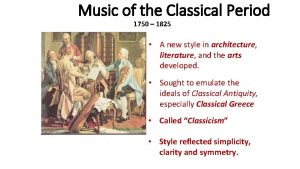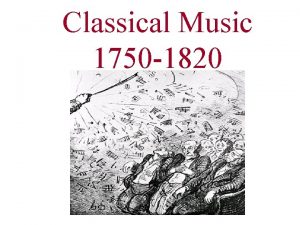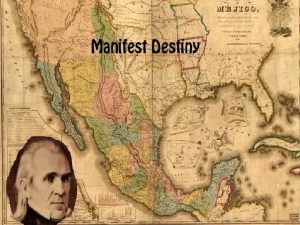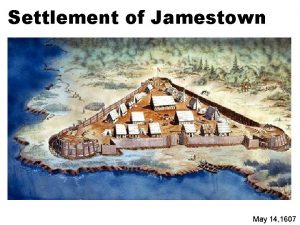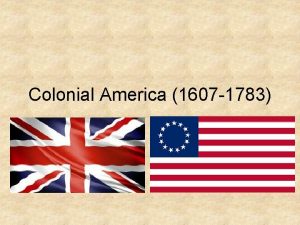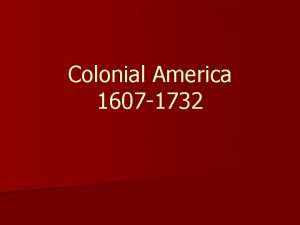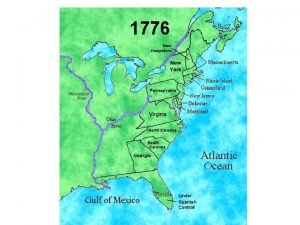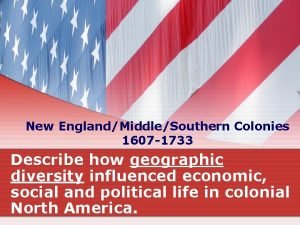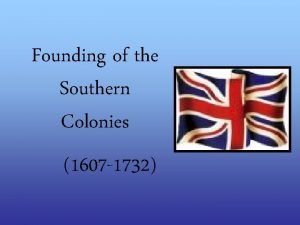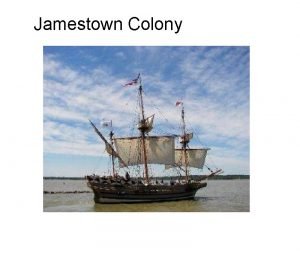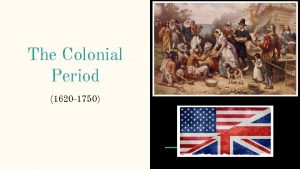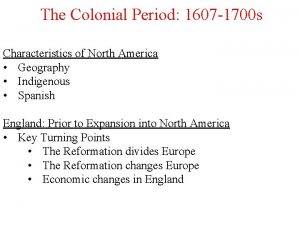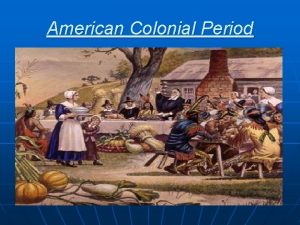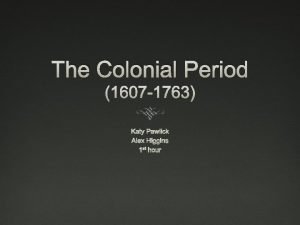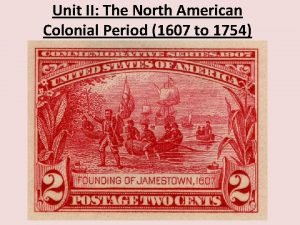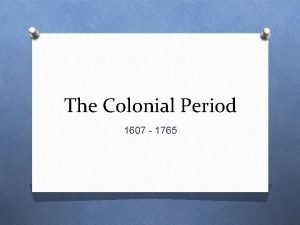The Colonial Period 1607 1750 s Characteristics of














- Slides: 14

The Colonial Period: 1607 -1750 s Characteristics of English North America England: Prior to Expansion into North America • Key Turning Points • The Reformation divides Europe • The Reformation changes Europe • Economic changes in England

The Puritans and Separatists- The Debate Christian Access to God • Catholic & conservative Protestants: Traditions of Church • Puritans: Corruption of Church for centuries Goals of the Puritans- 1630 Boston- to purify the Church • Broke with traditions • Individual congregation- began with covenant, election of ministers • Conduct represented salvation • Knowledge of redemption Goals of the Separatists (Pilgrims, 1620 Plymouth Colony) • Questioned legitimacy of Church of England • Paul: “Come out among them and be separate. ”

Economic Model of Colonies: Mercantilism, Corporations, Capitalism • • Mercantilism Merchants: relationship with King Chartered Companies: Corporations Corporate Colonies: Ventures in Capitalism By 1732: Three distinct colonial governments • Royal • Proprietary • Corporate

Slow to Enter the “New World”… Early Explorations: • Queen Elizabeth • 1576 Martin Frobisher (3 ships) Beginnings: 1607 - (after Spanish and French) Reasons for English Colonization • Establish markets for their goods- wool • Access to raw materials • Growing rivalry with Spain (Privateers) • Social Crisis- economic needs/population influx • Religious: Spreading Protestantism • Economic inequality- Masterless men

English Explorations and the First Settlement Early Attempts • Gilbert and Raleigh- Elizabeth I/ charter – Two attempts that failed – Half-brother- named the land Virginia • Roanoke- Failure – First voyage 1585 – Second voyage in 1587 – Governor White: war in England – Empty houses and the letters “CRO”

The Coming of the English Emigrants • Lower ranks of society • 1600 s- indentured servants Land Liberty • Basis for liberty- control of land vote The Indigenous • English wanted land • Resentment towards English • Alcohol: common and disruptive • Landscape changes: fencing, new crops, livestock, depletion of forest

Settling the Chesapeake: Jamestown and Maryland Founding of Jamestown 1607 • Virginia Company • Early Troubles – The “Starving Time, ” 1609 -1610 • Finding new “settlers. ” • Uprising of 1622 • Tobacco: Cross-breed strains • King James and the “evil weed. ” Founding of Maryland 1632 • Proprietary colony of Cecilius Calvert (feudal domain) • Refuge for persecuted Catholics

The New England Way The Rise of Puritanism • Shaped early New England • Congregationalists Moral Liberty • John Winthrop • Rejection of natural liberty for moral liberty The Pilgrims at Plymouth • 1620 -private investors Netherlands • The Mayflower- Cape Cod • The Mayflower Compact – No women signed document The Great Migration • 1629 Massachusetts Bay Company (London Merchants) • 1642 21, 000 Puritans

New England Divided Dissenters in the Puritan World • Roger Williams (Rhode Island) • Puritans and the Indigenous • The Pequot War Economic and Social Inequality • The New England economy • The Merchant Elite • The Half-Way Covenant

The 13 Colonies New England: Massachusetts, Rhode Island, Connecticut, New Hampshire Southern Colonies- Virginia, Maryland, North and South Carolina, Georgia Middle Colonies- New York, Pennsylvania, New Jersey, Delaware

Distinctions of Southern Colonies Governance: Corporate, Royal, Proprietary • Plantation Elite Economy: Single crop economics • Tobacco & Rice Social Structure • Stratified. English Law • Plantations • Biracial society- Black and White • English traditions: viewpoints about politics, religion, economy Indigenous Communities • Bacon’s Rebellion- Several Causes • Scapegoat: Indigenous Religion • Anglican- minor role in politics and economy*

Distinctions of the New England Colonies Governance: Early years/ under control of Crown/ Central & Local Gov. • Religious leaders through small town meetings Economy: Family-run farms and household manufacturing • Craftsmen and Merchants Social System: Clustered settlements • Indentured Servants • Cultural traditions: Diverse culture, economic, political, social Religion: • Strictly Calvinist faith- dictated political, social, economic Indigenous Societies: Europeans used concept of “divide and rule” Pequot War and Metacomet’s War • 1676

Distinctions of the Middle Colonies Governance: Diverse settlement • Unchartered- Delaware • Democratic: Pennsylvania • Small town governments Economy: Dutch-strong commercial economy- Hudson River Valley Social System: Multicultural • Small towns encouraged country governments • Separatist ideologies Religion: • Religious tolerance Indigenous Societies: Iroquois League (1451)

Women in the Colonial Era Western Christianity and the Proper Place of Women • Original sin of Eve= untrustworthy • Proper place for women • Paul- “Women should keep silence in the churches. ” • Patriarchal hierarchical family= basic unit of English society Gendered English Law: • No vote or participate in politics • “English law made to fit”- standards of acceptable behavior in colonies • Feme Sole: single women • Feme Covert: “taking the identity of husband” John Winthrop and the “True Wife” VS. Brabbling Women • Subjection to religious and familial authority • Outspoken in public Anne Hutchinson & the charges of heresy • Questioned teachings, Claimed direct revelations • Banished 1638 Witches and Witch Hunts • Reflection of societal stresses • Salem, Massachusetts 1691 -1692
 Classic period
Classic period Franz joseph haydn characteristics of music
Franz joseph haydn characteristics of music Music of classical period 1750 to 1820
Music of classical period 1750 to 1820 1750-1825
1750-1825 Expansion of the united states of america 1607 to 1853 map
Expansion of the united states of america 1607 to 1853 map Các số la mã
Các số la mã May 14 1607
May 14 1607 1783-1607
1783-1607 1732-1607
1732-1607 1776-1607
1776-1607 1491 to 1607 timeline
1491 to 1607 timeline 1733-1607
1733-1607 Carolina charter of 1663
Carolina charter of 1663 Jamestown colony
Jamestown colony Blood on the river jamestown 1607
Blood on the river jamestown 1607
